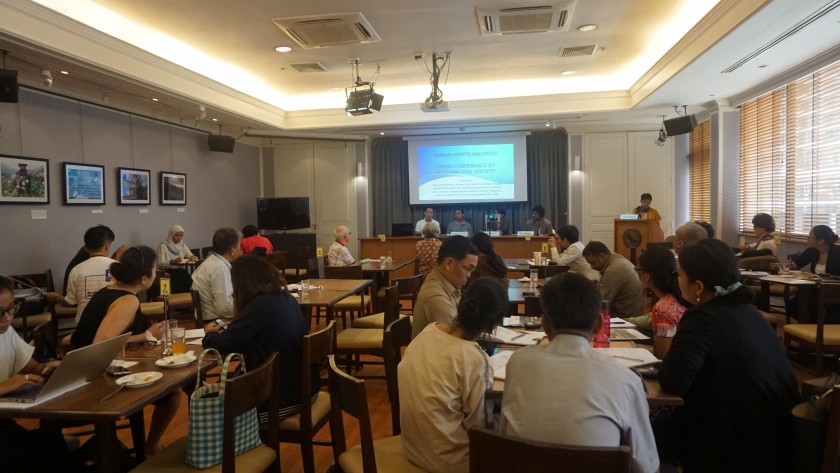More than 80 participants representing trade union, farmers, indigenous peoples, health and patients networks, women’s organisations, academia and civil society organisations from the region have gathered in Thailand on the sidelines of the 23rd round of negotiation of the Regional Comprehensive Economic Partnership (RCEP), the mega Free Trade Agreement (FTA) currently being negotiated by 16 countries including the 10 ASEAN countries along with India, China, Japan, South Korea, New Zealand and Australia.
Peoples’ movement have been long expressing concerns that the provisions in RCEP that are currently being negotiated in secret could undermine access to price-lowering generic medicines, negatively impact farmers and indigenous peoples rights to seed and food sovereignty, lock-in privatisation of public services, push workers’ wages down, and restrict the ability of governments to regulate public policies leaving them vulnerable to international lawsuits in secret tribunals.
“We have grave concerns over TRIPs plus provisions in the RCEP negotiation currently being pushed by South Korea and Japan. Like other countries in the region, Thailand heavily relies on generic medicines, especially for high-cost diseases like HIV & AIDS, cancers, hypertension and heart-diseases. Thailand’s health insurance systems, which are fully and partially subsidised by the government, will be under threat if the lifesaving medicines’ costs become more expensive due to the abuse of patent system,” said Chalermsak Kittitrakul, Access to Medicines Campaign Officer, AIDS Access Foundation.
“Thailand and other countries in Asia are one of the richest in biodiversity. Our bio resources have been passed from generation to generation. By requiring all RCEP countries to join UPOV 1991 or creating national laws that are consistent with UPOV 1991 will allow large, multinational corporations to claim ownership over these, causing tremendous damages to all small scale farmers," said Mongkol Duangkhiew of Alternative Agricultural network. "We the farmers will not let anyone rob us of our rich biodiversity."
Joms Salvador, Gabriela National Alliance of Women, Philippines added, “This trade agreement directly impacts women’s human rights, giving multi-national corporations the right to govern at the expense of women’s livelihoods, pushing wages down further with a race to the bottom where women are at the bottom. It is deeply concerning that while this trade agreement directly impacts so many lives, it is not being discussed with those most vulnerable and potentially impacted such as women, farmers, patients, workers, indigenous peoples and other marginalised group.”
“By prioritising the interests of corporations over the well-being of peoples, RCEP poses grave threats to the public interest,” said Shalmali Guttal, Focus on the Global South. “The Investor State Dispute Settlement (ISDS) mechanism will prevent governments from protecting the needs of their populations. The entire raft of new generation trade-investment agreements are building an architecture of impunity for corporations and elites, at the expense of people, the environment and societal well-being.”
A recent civil society assessment of RCEP against criteria for transparency, public participation and parliamentary scrutiny found that the mega trade deal miserably fails on all accounts. “Everyone, from elected parliamentarians concerned about potential job losses in their regions, to journalists investigating impacts on the affordability of life-saving medicines, to peasant organisations concerned about falling agricultural prices due to cheap imports have all been kept in the dark for the past five years,” said Benny Kuruvilla from the Transnational Institute (TNI), India.
Civil societies from the region strongly remind the governments negotiating the RCEP that economic cooperation and multilateralism should be based on equitable, fair and sustainable development. The 16 governments must consider the adverse impact of the mega FTAs and put an end to trade agreements such as RCEP as they only increase protection and power of multinational corporations.
Additional Information
1. Read the July 2018 report on ‘RCEP- a secret deal’ published by Friends of the Earth International (FOEI), Transnational Institute (TNI), Focus on the Global South, Indonesia for Global Justice (IGJ) and Paung Ku.
2. Read “How RCEP affects food and agriculture” also available in Khmer, Japanese, Thai, and Korean language.
3. Read APWLD’s Briefer on RCEP in Thai and English languages.
4. Watch civil society's No RCEP Campaign Video.
5. Read Asia and the Mega Free Trade Agreements by Focus on the Global South.
6. Read Trade Liberalization Through Free Trade Agreements (FTAs): Impacts on Agriculture and People in India by Focus on the Global South.
www.facebook.com/tcijthai
Tags






